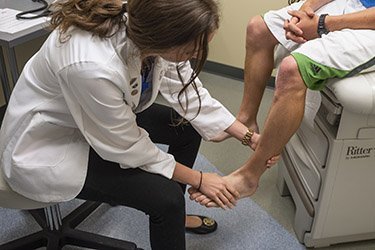Understanding the Role of a Biomechanical Podiatrist in Resolving Foot Pain

Foot pain can be a debilitating condition that affects a person's everyday life. Whether it's caused by an injury, overuse, or a medical condition, foot pain can significantly impact mobility and quality of life. One professional who plays a crucial role in diagnosing and treating foot pain is a biomechanical podiatrist.
What is a Biomechanical Podiatrist?
A biomechanical podiatrist is a specialized healthcare professional who focuses on the diagnosis, treatment, and prevention of foot and lower limb conditions related to biomechanical issues. These can include problems with the alignment, function, and movement of the feet and lower limbs.
Role of a Biomechanical Podiatrist in Resolving Foot Pain
When a patient presents with foot pain, a biomechanical podiatrist will conduct a thorough evaluation to determine the underlying cause of the pain. This may involve taking a detailed medical history, performing a physical examination, and using advanced imaging techniques such as X-rays or MRI scans.
Custom Orthotics
Based on the assessment findings, a biomechanical podiatrist may recommend the use of custom orthotic devices to help improve foot function and alignment. Custom orthotics are specially designed insoles that are worn inside the shoes to provide support, cushioning, and correction for biomechanical issues. By correcting alignment and distributing pressure more evenly across the foot, custom orthotics can help reduce the risk of injuries such as stress fractures, shin splints, and plantar fasciitis.
Footwear Recommendations
In addition to custom orthotics, a biomechanical podiatrist can also provide recommendations on appropriate footwear for specific sports or activities. Different sports and activities place varying demands on the feet and lower limbs, and wearing the right type of footwear is essential for optimal performance and injury prevention. The podiatrist can advise athletes on factors such as shoe fit, cushioning, stability, and support to ensure that they are wearing the most suitable footwear for their needs.
Biomechanical Correction Exercises
Alongside orthotic therapy and footwear recommendations, a biomechanical podiatrist may prescribe specific exercises to help correct biomechanical issues and improve strength, flexibility, and coordination in the feet and lower limbs. These exercises are tailored to the individual athlete's needs and may focus on areas such as calf strength, foot arch stability, and hip alignment. By addressing muscular imbalances and movement dysfunctions, athletes can enhance their overall performance and reduce the risk of injuries.
Performance Enhancement
By addressing underlying biomechanical issues and optimizing foot function, a biomechanical podiatrist can help athletes improve their performance in various ways. Better alignment and stability can enhance balance, agility, and power generation, leading to improved speed, endurance, and overall athletic ability. Additionally, by reducing the risk of injuries and enhancing biomechanical efficiency, athletes can train more consistently and effectively, ultimately reaching their full potential in their chosen sport.
Conclusion
Foot pain can have a significant impact on a person's quality of life, but with the help of a skilled biomechanical podiatrist, many individuals can find relief from their symptoms and improve their overall foot health. By taking a holistic approach to diagnosing and treating foot pain, biomechanical podiatrists play a vital role in helping patients regain mobility, reduce discomfort, and prevent future injuries. If you are experiencing foot pain or discomfort, consider consulting a biomechanical podiatrist for a comprehensive evaluation and personalized treatment plan tailored to your specific needs.
What's Your Reaction?











![Blog Submission Sites 2024 [High DA]](https://blognow.co.in/uploads/images/202306/image_100x75_6494a03eaff5e.jpg)
![Article Submission Sites 2023 [High DA & PA]](https://blognow.co.in/uploads/images/202307/image_100x75_64c4181f17036.jpg)
![Classified Submission Sites 2023 [High DA & PR]](https://blognow.co.in/uploads/images/202306/image_100x75_649dcd5260808.jpg)




![Article Submission Sites 2023 [High DA & PA]](https://blognow.co.in/uploads/images/202307/image_750x415_64c4181f08ed5.jpg)
![Classified Submission Sites 2023 [High DA & PR]](https://blognow.co.in/uploads/images/202306/image_750x415_649dcd5247eeb.jpg)
![Blog Submission Sites 2024 [High DA]](https://blognow.co.in/uploads/images/202306/image_750x415_6494a03e96bfa.jpg)
